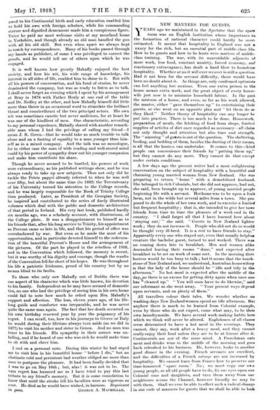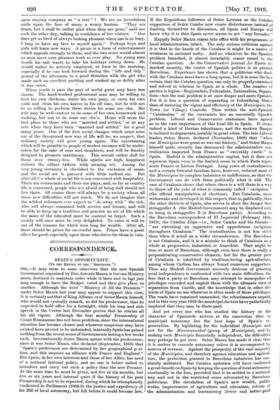NEW MANNERS FOR GUESTS.
YEARS ago we maintained in the Spectator that the spare room was an English institution whose importance in the formation of national character could hardly be over- estimated. It meant that hospitality in England was not a uxury for the rich, but an essential part of middle-class life. How to be guests and how to be hosts were matters of middle- class training. The war, with its unavoidable adjuncts ot more work, less food, constant anxiety, forced economy, and reactionary extravagance, has dealt a hard blow to humdrum -hospitality. Whether or no it will ever recover is still a question. Had it not been for the servant difficulty, there would have been no doubt about it. As things are, only confirmed optimist. can feel anything but anxious. 'Even one extra person in the house means extra work, and the great object of every house- wife just now is to minimize household labour. In the past the mistress of a house, and even, so far as his work allowed, the master, either "gave themselves up" to entertaining their guests, or else went on an opposite plan and " let them do as they liked." Neither theory of hospitality can any longer be put into practice. There is too much to be done. Housework, preparation of meals, the fetching of food from shops, limited supplies of articles of diet once regarded as necessary—all claim not only thought and attention but also time and strength. The " amusing " of guests is out of the question. The sheltering, feeding, and bedding of them, besides the dusting of their rooms. is all that the hostess can undertake. It comes to this—kind people can convenience their friends by "putting them up," but they cannot do any more. They cannot do that except under certain conditions.
A few days ago the present writer had a most enlightening conversation on the subject of hospitality with a beautiful and charming young married woman from New Zealand. She was preparing to return " home " with a demobilized husband. She belonged to rich Colonials, but she did not approve, had not, she said, been brought up to approve, of young married people beginning life with a servant. Herhome was to be upon a fruit farm, not in the wilds but several miles from a town. She pro- posed to do the whole of her own work, and to exercise a limited but frequent hospitality ; that is, she intended to give her town friends from time to time the pleasure of a week-end in the country. "I shall forget all that I have learned here about 'staying out,'" she said. "Guests in New Zealand lighter work ; they do not increase it. People who did not do so would be thought very ill-bred. It is a rest to have friends to stay." Apparently every one who stayed out, even that usually helpless creature the bachelor guest, turned to and worked. There was no coming down late to breakfast. Men and women alike descended leaving their rooms "done," and expected after breakfast to be set on work of some sort. In the Morning their hostess would be too busy to talk ; but it seems that the touch- stone of New Zealand and, we understood, Australian housewifery is that the lady of the house should be "idle and tidy in the afternoon." No hot meal is expected after the middle of the day so there is no excuse for getting dirty again when once one has cleaned up." "You will Boon have to do likewise," said our informant as she went away. "Your present ways depend upon servants, and on plenty of them."
All travellers colour their tales. We wonder whether on washing-days New Zealand women spend an idle afternoon. Bat anyhow there is much to be learned from Colonial example, even by those who do not expect, come what may, to be their own laundrymaids. We have several work-making habits here which we think will never be altered. Englishmen of all classes seem determined to have a hot meal in the evenings. They cannot, they say, work after a heavy meal, and they cannot really enjoy their food unless they are to be at leisure after it. Continentals are not of the same mind. A Frenchman eats meat and drinks wine in the middle of the morning and goes back refreshed to his business. He, however, looks to another good dinner in the evening. French servants are excellent, and the difficulties of a French menage are not increased by hospitality. We cannot learn from France how to preserve out time-honoured "apace room." No; we must copy our own young people, as all old people have to do, fix our eyes upon our Colonial sons and daughters, and turn them away from our neighbours across the Channel, however friendly we may be with them. Shall we ever be able to effect such a radical change in our code of manners for guests that we shall be able to look upon staying company as "a rest " ? We see an incredulous smile upon the face of many a weary hostess. "They are dears, but I shall be rather glad when they are gone," said one such the other day, talking in confidence of her visitors. "One does get BO tired of always looking pleasant when one is so busy. I long to have my face to myself again." Perhaps boys and girls will learn new ways. A picnic is a form of entertainment which appeals strongly to them, and the two sexes would almost as soon meet over pleasant work as over play. No young man worth his salt wants to take his holidays sitting down. He would rather he actively employed, at least in the morning, especially if he can look forward during the "idle and tidy " period of the afternoon to a good flirtation with the girl who made such an excellent pudding and washed up so deftly after it was eaten. •
When youth is past the part of useful guest may have less charm. The hard-worked professional man may be willing to feed his own chickens, water his own pony, or carry his own coals and clean his own knives in his off time, but he will not be so willing to perform these duties for some one else. His wife may be well content to do some of her own housework and cooking, but not to do some one else's. Home will seem the best place to those who are "married and settled," or at any rate when they have been "married and settled" for a good many years. One of the first social changes which must arise out of the threatened new way of life will be, we suspect, that ordinary society will grow young .again. The entertaining which will be possible to people of modest incomes will be under- taken for the sake of sons and daughters, and will be frankly designed to promote matrimony. This sounds rather dull for those over twenty-five. While spirits are high, happiness endows the silliest talkers with seeming wit. Among the very young certainty is cherished to the exclusion of sense, and the social art is pursued with little enthusi -sm. But after all tl:e whole of social life is not concerned with hospitality. There are restaurants and there are plays, and, so far as country life is concerned, people who are afraid of being dull should not live there. Of course there will always be a society whom all these new difficulties will not touch. We do not imagine that the wildest reformers ever expect to "do away with" the rich, who will always command both service and leisure, and will be able to keep up a tradition and practise an art of life which the mass of the educated must be content to forget. Such a society will once more be very delightful. To enter it will be one of the reasons for which men long for wealth. After all, there should be prizes for successful men. Prizes have a great effect for good, especially upon those who strive for them in vain.



































 Previous page
Previous page